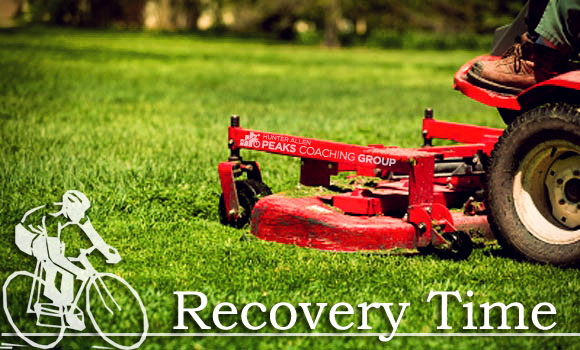By BJ Basham, PCG Master Coach

Cycling is all about efficiency. It’s easy to find stuff we can buy for our bikes that’s supposed to make them faster, but the benefits of an efficient training schedule far outweigh any gains that a new set of wheels or carbon bars can provide.
A well-thought-out training plan involves the two main components required to improve performance: overload and recovery. Your coach can give you specific workouts, and there are several tools (such as power meters and software) to provide you with the most efficient means of getting the right amount of overload, but it is really up to you to make the most efficient use of the time provided for recovery. It’s important to remember that just because you’re not on the bike or in the gym doesn’t mean you’re getting the rest you need to recover from the overload of your last training session.
So what can you do to make the most efficient use of the recovery time built into your training plan? Click through for some ideas…
The first step is to look at all the activities in your day-to-day life that might affect your ability to recover. For most of us, this includes going to work and taking care of our houses and families. Next, think about what you can do to make the most efficient use of the time you have each day. Could you change your work schedule so that you’re not sitting in rush hour traffic each day? Could you work from home? What activities around the house can you change to make more efficient use of your time? Are there elements that add to the level of stress in your life? What can you do to reduce the level of stress?
We cyclists love to own the latest equipment, but once your bike is set up to a safe and reasonable weight, a lot of thought should go into the next component you buy with the idea that it will make it faster. Remember, without a rider, the bike just leans against the wall not going anywhere. You should think about whether your money could be better spent in some other way to make you faster. It’s possible to buy speed for your bike, but most cyclists don’t realize that the bike shop isn’t the only place they should be shopping. I like to say that a lawn tractor would have a much greater effect on my racing career than a 15-pound bike ever could.
Remember, there are two parts to the training formula, and recovery is just as important as overload. Try to find ways to make your recovery time as efficient as possible so you’re rested and ready for your next workout.
 BJ’s coaching philosophy is based on flexibility and communication. He believes that every training plan should be written in pencil, as very few people can control everything that may come up in their lives or know exactly how they will respond to a given training load or personal event. He works together with his athletes to do what it takes to help them reach their goals with the time and resources available. BJ’s primary goal is to bring his athletes to the point where they enjoy the time they spend cycling. He teaches the importance of balancing work, training, and rest; how to take care of your equipment; and even how to juggle (literally). For more info about coaching and training, contact BJ at info@peakscoachinggroup.com or at www.peakscoachinggroup.com.
BJ’s coaching philosophy is based on flexibility and communication. He believes that every training plan should be written in pencil, as very few people can control everything that may come up in their lives or know exactly how they will respond to a given training load or personal event. He works together with his athletes to do what it takes to help them reach their goals with the time and resources available. BJ’s primary goal is to bring his athletes to the point where they enjoy the time they spend cycling. He teaches the importance of balancing work, training, and rest; how to take care of your equipment; and even how to juggle (literally). For more info about coaching and training, contact BJ at info@peakscoachinggroup.com or at www.peakscoachinggroup.com.